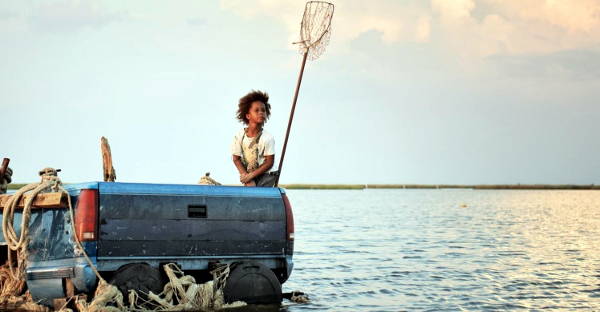
Creating a unique world in film is difficult. The safe bet is to stick to the real world or go so fantastical as to render it unrecognizable. Those who dare to mix the real and fantastical face the challenge of overcoming an audience never believing a single moment. If there is one only one thing Benh Zeitlin pulls off in his first feature length film, Beasts of the Southern Wild, it is creating a world all its own, with one foot steeped in reality and the other planted in the clouds.
Bathtub is somewhere in the Bayou, an island unto its own, filled with people living in poverty which include a young girl named Hushpuppy (Quvenzhané Wallis) and her father, Wink (Dwight Henry). Hushpuppy lives with her dad but in her own home. Dad seems barely capable of caring for himself and demands that Hushpuppy fend for herself, possibly because he senses his days are numbered, but it’s just as likely Wink is skirting responsibility while drowning in his own sorrow (not to mention liquor) of not having Hushpuppy’s mother with him. The feisty independent girl longs for her mother and is angry her father can disappear for days without notice.
Some of the Bathtub community are defiant, so much so that they won’t evacuate when a major storm is approaching. Instead of fleeing, Wink and others hunker down. They do their best to survive the storm and hold onto what little they call their own. Hushpuppy thinks the storm is happening because the icecaps are melting and will unleash some oversize warthog looking beasts. She learned this at school. At this point, shots of melting icecaps invade the screen. I’m not sure if the images and lore were meant to convey a heavy handed message, but it felt like there was a parallel being made between Katrina and global warming. Far from an activist film, Beasts also doesn’t hide the similarities of its world and the one of New Orleans right after hurricane Katrina.

The storm comes and trounces the Bathtub with non-stop water. Wink, Hushpuppy and some of their neighbors are left to survive the elements while figuring out what they’re going to do longer term. The journey meanders a bit, allowing us to get a fuller picture of just how adamant this community is about living life on their terms, no matter how hard the government or other outside forces try to rescue the remaining Bathtub residents.
In between the fantastic voyage and strange images of beasts racing towards the Bathtub, there is a story of a little girl who wants to find her mom and somehow make things work between her and her overbearing, sometimes abusive father. The father-daughter relationship on screen is a challenge. One of them we root for and the other against. While folklore rules the day and people revel in their plight in life, wisdom is in short supply, which is probably why the film’s most touching moments seemed a bit distant for me. The intended impact never hit fully as I found it difficult to completely empathize with a father who can’t seem to look outside of himself and a community that seems to pride itself in debauchery as much as it does in being a loving responsible community.
The cinematography and score are beautiful, creating a world all its own. The challenge is when the deeper emotional moments and themes don’t resonate as much as the gorgeous sights and sounds. What seemed like it could have been a one-of-a-kind masterpiece falls short, but there is much to love, including amazing performances by first time actors, Quvenzhané Wallis and Dwight Henry.
[xrr rating=3.5/5 label=” “]
[netflix:70229269:img:false:end]
This post is part of my Way late reviews. Read more reviews here.
[youtube width=”640″ height=”360″]http://www.youtube.com/watch?v=LA6FFnjvvmg[/youtube]


